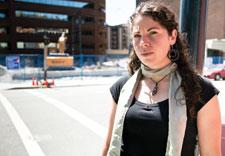Canada’s only youth-driven HIV/AIDS agency is scrambling to find a new home after getting word that its lease will be prematurely terminated this August.
YouthCo AIDS Society, a non-profit offering peer support and education to positive youth aged 15–29, many of whom are street-involved, was told at the beginning of May it would have to vacate its location at 900 Helmcken St two months hence.
The news came from AIDS Vancouver, which is subleasing the space to YouthCo.
AIDS Vancouver negotiated to end its own lease as a cost-saving measure after it received massive funding cuts in December. The organization will consolidate all of its services at its primary location at 1107 Seymour St, says Fleur Cooper, AIDS Vancouver’s development and communications manager.
“As a subtenant, we had no rights,” says Stephanie Grant, YouthCo’s executive director.
The move has left YouthCo, whose sublease would have continued to 2012, scrambling to find a new location.
On June 14, YouthCo was granted an extension of its sublease by the property’s landlord, to August 31.
However, Grant says finding a new space is tough because there is stigma around the type of work YouthCo does: working with homeless, HIV-positive people.
“Many of the places won’t even bother having us come look at the place because as soon as they hear what we do, they don’t want it in their building, or connected to their building,” Grant says, “so we don’t even get an interview to go and look at the spaces.”
Grant says YouthCo has approached more than 15 locations and has put in offers on three.
“None of them have gone through.”
Paul Oteman, principal and managing broker of RPM Realty, who is helping YouthCo find a new location, agrees that the process has been challenging.
“[Landlords] have to consider the fact that if there’s a tenant that some might feel undesirable next to an existing office user, then they run the risk of losing a good office tenant, and they don’t want to take that risk, obviously.”
He says they are getting “some good response” back from some landlords, though.
The City of Vancouver has also said it will assist YouthCo in finding a new space.
Lesbian councillor Ellen Woodsworth describes YouthCo as a “critical service” and an “incredibly important organization who’s done cutting-edge work with youth for a number of years.”
“We are happy to work with them to help them find another location,” Woodsworth says. “It’s important that YouthCo be stable to continue the work they’re doing.”
Grant agrees. She says if YouthCo is forced to shut down services until it finds a new home, its roughly 125 clients — many of whom are struggling with addictions and homelessness — will have nowhere to turn for support.
“For a lot of these youth, we’re their primary contact. And if they lost that lifeline, I worry that they’d fall right back into addictions and regular street life, where they are extremely vulnerable to sexual exploitation, to older predators on the street.”
Relocating is not a new experience for YouthCo. Since its inception 16 years ago, the organization has had to move house a few times to make way for condo developments, Grant says.
“It’s becoming rarer and rarer that there’s space available that’s affordable for non-profits doing the kind of work that we’re doing, because of high rises being built.
“We’re getting kicked out of the downtown core,” she says, “which is where we need to be.”

 Why you can trust Xtra
Why you can trust Xtra


